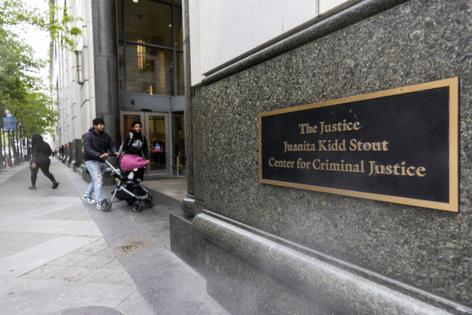Charges against a man were dismissed. Then a Philly police officer escorted him into ICE custody
Published in News & Features
PHILADELPHIA — A Philadelphia Police officer escorted a Dominican national out of Philadelphia’s criminal courthouse and into custody of U.S. immigration authorities last week, shortly after a judge had dismissed all criminal charges against the defendant.
The Defender Association of Philadelphia and other advocates questioned what the apparent cooperation with Immigration and Customs Enforcement meant for Philadelphia’s so-called “sanctuary city” policies.
Jean Carlos Brito-Munoz, 30, was arrested on April 2 for allegedly carrying a concealed firearm without a license in the city’s Juniata section, according to police and court records. But Municipal Court Judge Bradley K. Moss dismissed the felony charge on April 17 for lack of evidence.
At that time, Brito-Munoz would have been free to go.
Instead, according to Brito-Munoz’s public defender, a sheriff and a court staffer instructed Brito-Munoz not to leave because he was wanted by ICE agents. A police officer in the courtroom then escorted him outside, to awaiting federal authorities. Brito-Munoz remains in immigration detention at the Federal Detention Center in Philadelphia.
A police department spokesperson, Eric Gripp, said that the Spanish-speaking officer “offered to walk with Brito-Munoz downstairs for translation purposes,” but did not detain him.
Brito-Munoz, Gripp said, surrendered on his own.
It was at least the third time in recent months that ICE agents detained someone outside the city courthouse, which was long viewed as off limits for federal immigration enforcement.
But the previous arrests did not appear to involve assistance by Philadelphia police. Under executive orders dating to the administration of Mayor James Kenney, law-enforcement officers were instructed not to honor ICE detainers, and the city terminated ICE access to the police arrest database.
Gripp said ICE does not have access to Philadelphia Police internal records or databases, but noted that court dockets are public.
State Rep. Danilo Burgos, who represents parts of North Philadelphia, said fears have increased in recent months about ICE encounters around courthouses.
“It’s very disturbing,” said Burgos, who was the first Dominican legislator elected to the Pennsylvania General Assembly.
The incident raises questions about Philadelphia’s relationship with ICE amid the Trump administration’s crackdown on undocumented immigrants. Mayor Cherelle Parker has not explicitly reaffirmed Philly’s commitment as a sanctuary city, but neither has she revoked the executive orders.
“If they are sharing information, they’re going contrary to what city officials are saying,” Burgos said.
Guidelines adopted by the First Judicial District in February and obtained by the Inquirer emphasized that, while staffers could share information with ICE, they did not need to assist them without a judicial warrant or court order.
The memo, issued in response to a newly issued ICE directive expanding courthouse enforcement actions, stated it was best practice not to inquire about a defendant’s immigration status, but did not prohibit voluntary sharing of information with ICE.
A court spokesperson said the courts were “looking into” staffers’ role in last week’s arrest, but referred questions to the sheriff.
A spokesperson for the sheriff declined to comment on Brito-Munoz’s arrest, but said its policy is to detain anyone subject to an active warrant, including in collaboration with other agencies.
Brito-Munoz, who is being held at the Federal Detention Center in Philadelphia, had no prior criminal record in Pennsylvania, though he did have a summary citation in traffic court for driving without a license in April 2024. According to the Defender Association, he lives with his family in Massachusetts, but has a child in Philadelphia.
Regardless of what happened in the Brito-Munoz case, it is clear that information has been flowing between local police and federal law enforcement.
Scores of deportation cases filed in the U.S. Eastern District of Pennsylvania in recent years followed a pattern: First, a person is arrested by the Philadelphia Police Department or another local department for offenses ranging from drunk driving to drug dealing to assault. Then, police run the defendant’s fingerprints through a federal database. If the person has previously been deported, that automatically pings ICE, according to court paperwork.
In other cases, ICE agents made arrests in the field while serving on a joint drug task force in collaboration with the Philadelphia Police or Pennsylvania Attorney General — using portable fingerprint scanners to immediately identify those who had previously been deported, according to court records.
The Inquirer could not immediately verify whether Brito-Munoz had been previously deported. Attempts to locate his family were not successful.
It’s unclear how often arrests are being made around Philadelphia courts. In March, agents picked up a man outside the Criminal Justice Center while advocates from the group Juntos shot video and tried to intervene. Last October, they stopped a Mexican national on the way to court in Philadelphia for a hearing for an assault case, according to an affidavit filed in the case.
In a social media post in March, Juntos raised questions about how ICE was accessing information about its clients and accused them of “flagrant disregard for due process.”
Burgos said such enforcement could deter undocumented people from responding to court summons to resolve criminal and civil issues.
“Some of these people are going to court because they want to cooperate,” he said. “It’s going to make our city less safe.”
---------
Staff writer Ryan W. Briggs contributed to this article.
©2025 The Philadelphia Inquirer, LLC. Visit at inquirer.com. Distributed by Tribune Content Agency, LLC.







Comments